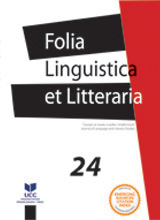EDNA PONTELLIER’S DIGRESSIVE QUEST FOR THE MATERNAL IN KATE CHOPIN’S THE AWAKENING
EDNA PONTELLIER’S DIGRESSIVE QUEST FOR THE MATERNAL IN KATE CHOPIN’S THE AWAKENING
Author(s): Nilsen GökçenSubject(s): Theory of Literature, American Literature
Published by: Filološki fakultet, Nikšić
Keywords: The Awakening; Kate Chopin; Edna Pontellier; maternal search; sea; suicide;
Summary/Abstract: The quest that Kate Chopin’s heroine Edna Pontellier undertakes in The Awakening begins in the summer she spends in Grand Isle in the sensuous atmosphere of the Creole society and her newly found self with Madame Ratignolle and Robert Lebrun. The former, whom Chopin calls mother-woman, embodies all the qualities of womanly beauty, virtue and motherly attachment. With her, Edna, an orphan who lost her mother at a very young age, awakens to an emptiness left by her mother’s loss, which she had formerly tried to repress. Although the novel has often been read from the perspective of sexual awakening, her awakening involves a deeper and archaic need for mother. Edna tries to satisfy her maternal yearnings first with Madame Ratignolle and then with Robert, who has to compete with her for priority in Edna’s life. Next to these flesh and blood substitutes for mother, there is the sea, a stronger maternal force that murmurs to Edna in sonorous tones at the key points of her gradual awakening. In the end, Edna answers the entreaty of the sea leaving behind not only her husband and children but also the two characters that had substituted for her mother. At the end Edna’s need for mother is seen to be a need for transcendence rather than a physical embodiment that can be found in the immanent world, and despite their competitive representations, both Madame Ratignolle and Robert Lebrun prove in the end to be digressions on her journey to her final destination, the sea.
Journal: Folia Linguistica et Litteraria
- Issue Year: 2018
- Issue No: 24
- Page Range: 23-43
- Page Count: 21
- Language: English

